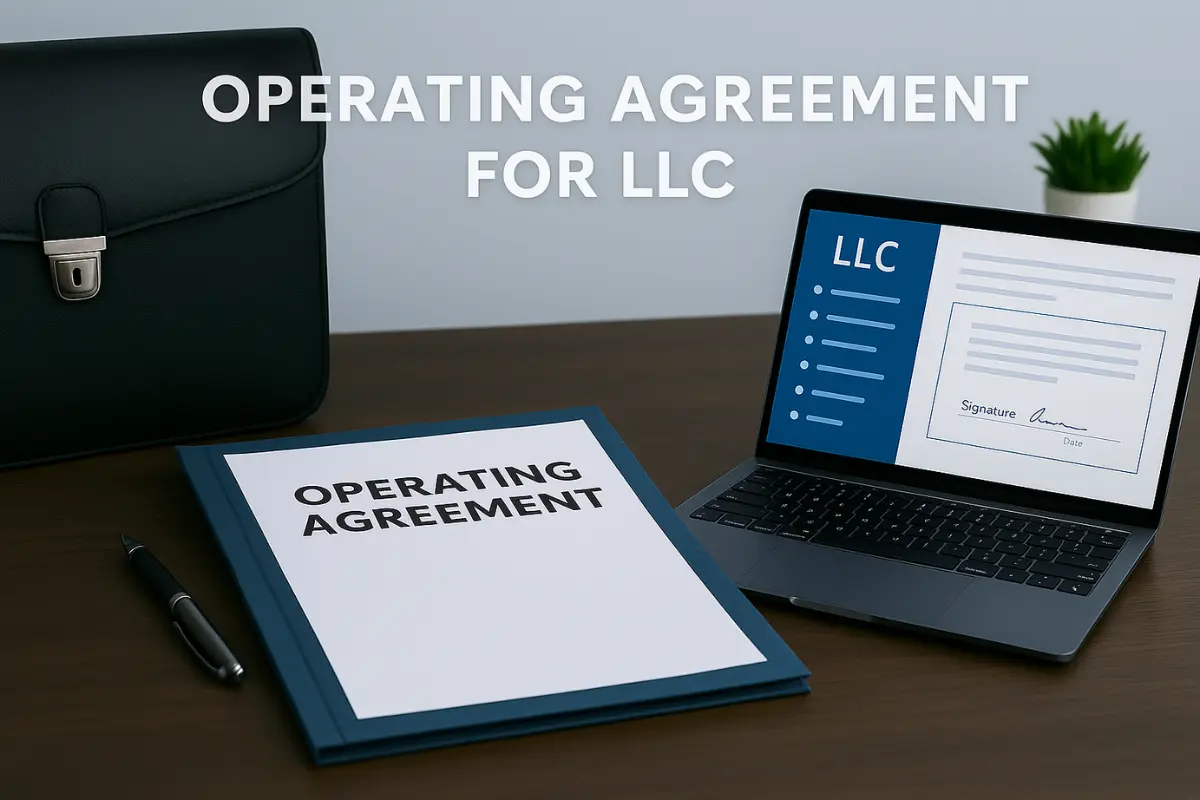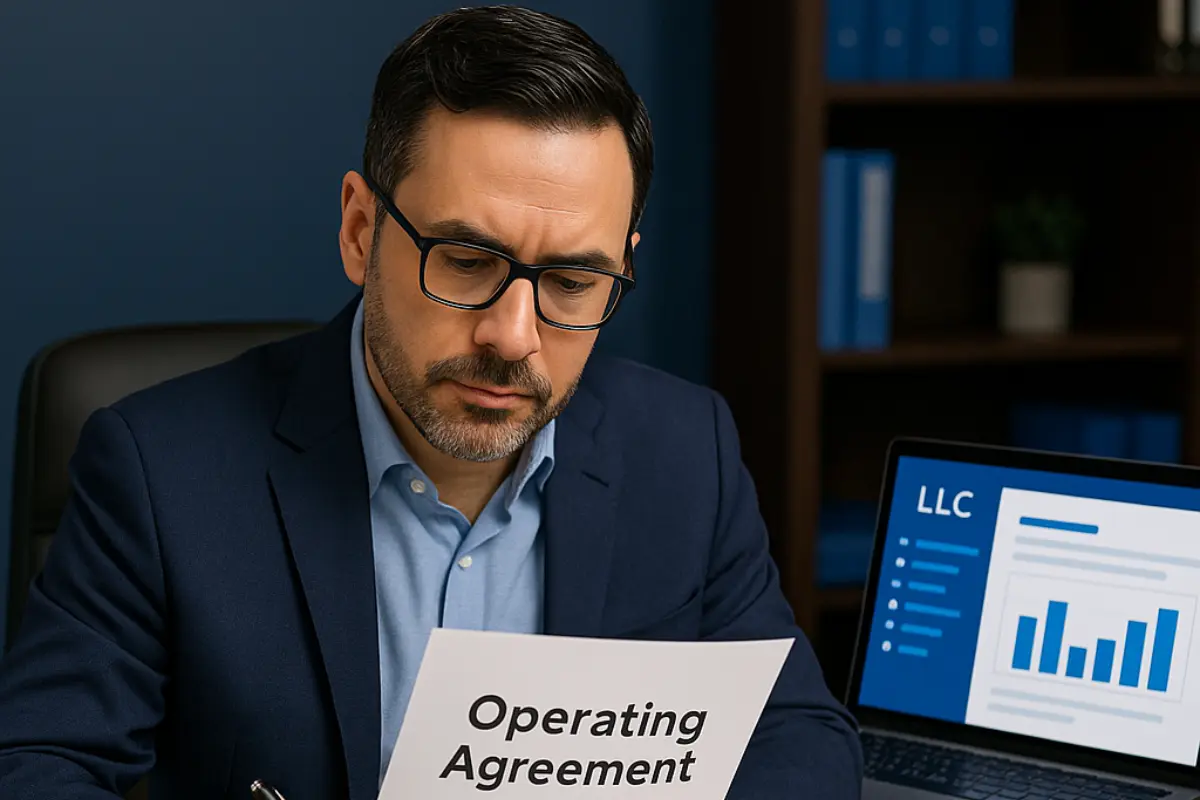Do I Need an Operating Agreement for My LLC? | Essential Guide

Imagine this scenario: you’ve just formed your limited liability company (LLC) when, suddenly, a dispute arises with your business partner about profit distribution. Without a written operating agreement in place, what seemed like a simple disagreement now threatens to tear your business apart and drain your savings through legal fees. The solution? An LLC operating agreement—a document that could have prevented this costly nightmare entirely.
An LLC operating agreement is your business’s internal rulebook, a legal document that governs how your limited liability company operates day-to-day. It outlines everything from ownership percentage to decision-making processes, creating a roadmap for success while protecting your limited liability status.
Many entrepreneurs mistakenly believe operating agreements are just optional paperwork, especially if their state doesn’t legally require one. This misconception leaves your business vulnerable to disputes, threats to limited liability protection, and increased risk of personal liability for owners. Even if you’re the sole owner, an operating agreement is crucial for a single-member LLC because it helps prove your business is a separate legal entity, reinforces your personal liability protection, and is often required by banks or investors to open accounts or secure funding.
Whether you own a single-member LLC or have partners, understanding and using an operating agreement could save you thousands in legal fees. This guide will explain when you need one, what to include, and how to create an operating agreement that protects your LLC.

What is an LLC Operating Agreement?
An LLC operating agreement is a formal document that describes how ownership is divided, how the company will be managed, and the guidelines for daily operations within a limited liability company. This internal document serves as the governing contract between LLC members or even with yourself if you're running a single-member LLC. According to Thomson Reuters, a leading provider of legal and business information, "An operating agreement is invaluable in laying out how the LLC is arranged, how it will be run, and how it goes about its work. Essentially, an operating agreement is a contract; once signed, the LLC members are bound by its terms."
Unlike your Articles of Organization, which must be filed with the state, your operating agreement remains internal and doesn't get submitted to government agencies. A typical LLC operating agreement includes basic company information (such as company name, address, and registered agent details) and the business purpose of the LLC. The agreement should also address key elements and basic governing principles, such as owners' rights, responsibilities, and procedures for resolving disputes. The LLC operating agreement outlines your business's instruction manual, created by you and your fellow members, to prevent confusion and conflict.
Is an Operating Agreement Required in Every State?
Not many states require LLCs to have an operating agreement, but some states, such as California, New York, Missouri, and Maine, have made them a legal requirement, especially for multi-member LLCs. However, even if your state doesn't require operating agreements, having one is still crucial. Operating without this document means your limited liability company will be subject to your state's default LLC rules. These rules act like a one-size-fits-all approach to business governance. Think of them as the default settings on your TV. They provide the basic formula that your LLC will operate under, but you can adjust them to your preference within your operating agreement.
Depending on your circumstances, operating under your state's default LLC rules can be limiting. As The Law Offices of Brian E. Barreira explain, "Many states, for example, have a default rule that requires owners to divide up LLC profits and losses equally, regardless of each member's investment in the business. If you and your co-owners did not invest equal amounts in the LLC, you probably don't want to allocate profits equally. To avoid this, your operating agreement must spell out how you and your co-owners will split profits and losses."
Without an operating agreement, you're essentially letting the state's default rules make critical operating decisions for your business structure.
Why You Still Need an Operating Agreement
Even in states where operating agreements aren't legally required, having one is one of the smartest business decisions you can make.
Beyond guiding internal operations, an operating agreement helps your business transform into a formal structure with clear governing rules. It clarifies business operations, establishes legitimacy with banks, protects your personal assets, and helps prevent costly disputes.
Preserving Limited Liability Protection
Your operating agreement plays a crucial role in maintaining the legal separation between your limited liability company and its members (owners). This separation forms the foundation of your limited liability protection, which helps shield your personal assets from business debts or liabilities.
A well-drafted operating agreement demonstrates that you treat your LLC as a separate legal entity from yourself, with distinct procedures in place. This documentation can serve as crucial evidence if your limited liability status is ever challenged and helps prevent owners from being held personally liable for the company's obligations. Without proper documentation, courts might decide you are not operating as a separate legal entity and "pierce the corporate veil." If this happens, you can be held personally liable for business debts or liabilities.
Many business formation and registered agent service providers recommend creating this document when you initially form your LLC to strengthen your liability protection from the beginning.
Preventing Internal Disputes
When LLC members understand their roles, responsibilities, and decision-making authority from the start, disputes become far less likely. An operating agreement provides clarity for LLC members by clearly outlining their rights, obligations, and protections. Imagine two LLC members disagreeing about profit distribution, management responsibilities or choosing between LLC vs S-Corp tax structures. Without a clear operating agreement, these types of disagreements can escalate into divisive scenarios that can destroy business partnerships and result in expensive legal fees.
As Attorney at Law Magazine emphasizes, "By addressing potential issues upfront, operating agreements can minimize the risk of disputes and provide mechanisms for resolution." A well-written operating agreement can serve as a preventive measure, providing clarity by establishing specific procedures for distributing profits, voting rights, and resolving disputes.
Establishing Financial Procedures
Your operating agreement defines exactly how profits, losses, and capital contributions are handled among members, preventing confusion about financial obligations. Members' contributions can include cash, property, or intellectual property and should be clearly documented in the agreement. The agreement outlines contribution requirements, distribution schedules and accounting procedures for tracking business expenses and managing financial obligations.
Without these clear financial guidelines, LLC members might have different expectations about their financial rights and obligations, leading to disputes and compliance problems. For single-member LLCs, having clear financial guidelines is key for organizational and tax reporting purposes.
Ensuring Operational Legitimacy
An operating agreement signals professionalism to banks, investors and legal authorities. Many banks require an operating agreement before opening business accounts or approving financing. This is particularly important for new small businesses seeking to establish themselves.
Because projecting legitimacy is so important in the early stages, many new business owners find themselves debating between choosing a corporation or an LLC and wondering which structure will make them "appear more legitimate." While a traditional narrative has been that corporations are more established, more prestigious and provide more credibility, the truth is that LLCs are widely used and accepted in the business world.
An operating agreement only further reinforces an LLC's business credibility and strengthens its legal protections while clearly defining its operating procedures. Professional business formation services like InCorp can help LLCs quickly establish business credibility by ensuring the right documents are in place when the business is first registered.
What Should Be Included in an LLC Operating Agreement?
A comprehensive operating agreement should cover all essential aspects of your LLC's ownership structure and operations. Similar to how corporate bylaws govern corporations, an operating agreement establishes the fundamental rules for your LLC. The ownership structure section details each member's ownership percentage, capital contributions, and profit/loss sharing arrangements. This prevents disputes by clearly establishing ownership interest and how financial benefits are distributed.
Management structure defines who has authority—whether it's member-managed or manager-managed—how voting works and what actions require member approval. Some LLCs choose member-managed structures where all owners participate, while others prefer manager-managed LLC arrangements with designated decision-makers.
Financial procedures outline how profits are distributed and procedures for additional capital contributions. Member rights and responsibilities specify what members can and cannot do, their duties to the LLC, exit procedures for departing members, and restrictions on transferring ownership interests.
Including these detailed provisions helps ensure smooth day-to-day operations, reduces legal risks, and prepares your LLC for future changes or disputes.
Single-Member vs. Multi-Member LLC Operating Agreements
The structure and complexity of your operating agreement depend significantly on whether you're operating a single-member LLC or a multi-member LLC. Both types benefit from having formal agreements, but they address different challenges.
Single-member LLC operating agreements focus primarily on establishing legitimacy and protecting limited liability status. Since there's only one owner, there's no need for complex voting procedures or dispute-resolution mechanisms between other members.
Multi-member LLC operating agreements require more detailed provisions addressing member relationships, decision-making processes, and conflict resolution.
Regardless of size, both types of LLCs should have operating agreements to formalize business practices, protect liability status, and support banking or legal needs. Banks often require operating agreements regardless of member count, and proper documentation strengthens your legal position in either structure.

How to Create an Operating Agreement
Drafting a strong operating agreement involves thorough preparation and a focus on your unique business requirements. Start by identifying your LLC's unique characteristics—number of members, business type, management structure, and future plans.
The creation process involves choosing the right format for your situation, customizing the content to meet legal requirements, and properly finalizing and storing the document. Business owners have several options available, from DIY templates to professional legal services, and should consider their specific needs and state legal requirements when deciding which approach works best.
DIY vs. Legal Support
Business owners can take different approaches when drafting their operating agreement, ranging from free templates they can fill out themselves to hiring an attorney. Basic online templates can work well for simple, single-member LLCs with straightforward operations.
Professional services become essential for complex ownership structures or multi-member LLCs, where legal nuances are more significant. Business formation services offer a middle-ground solution, providing more customized document support than basic templates while remaining much more affordable than traditional legal representation.
Tailoring the Agreement to Your State's Laws
Each state has its own default rules and requirements, so your operating agreement should be customized to align with local regulations. Generic templates often fail to account for these state-specific rules and requirements. State law varies on topics like member voting rights, management structures, and dissolution procedures. Your agreement should either work within these frameworks or explicitly override the state's default rules where legally permissible.
Consider consulting your Secretary of State's website or legal experts familiar with local regulations to avoid conflicts or unenforceable clauses.
Best Practices for Maintaining the Agreement
Keep the signed agreement in a secure, accessible location, and ensure all members have current copies. Review your agreement annually or after major business events, such as adding or removing members, changing your business structure, or relocating to a different state. Document any modifications with written amendments signed by all members. Verbal agreements can create confusion and may not be legally enforceable.
Following these best practices helps protect your LLC and ensures everyone is on the same page.
FAQs
Is an Operating Agreement legally binding?
Yes, once signed by all LLC members, an operating agreement becomes a legally enforceable contract. Courts will generally enforce properly drafted agreements that comply with state law.
Do I need to file my Operating Agreement with the state?
No, operating agreements are internal documents that typically don't need to be filed with state agencies. The operating agreement remains private between members, though you may need to provide copies to banks or lenders.
Can I change my Operating Agreement later?
Yes, you can update your operating agreement anytime with proper member consent and documentation. Most agreements include amendment procedures specifying how changes can be made. All changes should be in writing.
What happens if I don't have an Operating Agreement?
Without an operating agreement, your LLC will operate under your state's default rules, which may not protect your interests. Default rules often require unanimous consent for routine decisions and mandate equal profit sharing regardless of contributions, leading to operational difficulties and legal burdens.
Does a single-member LLC need an Operating Agreement?
Yes, single-member LLCs benefit significantly from having operating agreements. These documents help maintain the legal separation between the LLC and the owner, which is crucial for limited liability protection. Banks often need an operating agreement for business accounts.
Should I write my own Operating Agreement?
While you can write your own operating agreement using templates, the complexity of your LLC determines whether this is advisable. Simple single-member LLCs might use basic templates, but multi-member LLCs benefit from professional guidance.
Who needs an LLC Operating Agreement?
Every LLC should have an operating agreement, regardless of size or complexity, even in states where it isn't legally required. Single-member LLCs need agreements to maintain limited liability protection and demonstrate business legitimacy. Multi-member LLCs require operating agreements to prevent disputes and clarify member relationships. Banks and investors may also require an operating agreement for business accounts or funding. The benefits far outweigh the costs for any LLC structure.
Final Thoughts: Better to Have It Than Regret It
Every limited liability company benefits from having a comprehensive operating agreement, regardless of state requirements. This legal document provides essential protection, operational clarity, and business legitimacy.
An operating agreement transforms your LLC from a basic business entity into a professional organization with clear rules and procedures. It protects your limited liability status, helps prevent costly internal disputes, and demonstrates credibility to banks and investors.
InCorp's business formation experts can help ensure your operating agreement meets legal standards while reflecting your specific business needs. If you haven't formally registered your LLC, we can complete the process on your behalf. Additionally, we offer registered agent and compliance services to help keep your company in good standing with state regulations. Contact us today to get started and give your business the foundation it deserves.
Share This Article:
Stay in the know!
Join our newsletter for special offers.